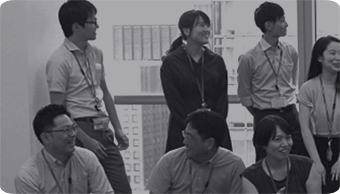"Effectively Utilize Diversity"
(Three Pillars ⑶)
In order to address the needs of various stakeholders, the Bank believes it is essential to secure human resources that are rich in diversity. We therefore promote Diversity Management in aims of building a culture that respects the diverse value sets of every employee, and that recognizes this diversity as a strength of the organization.
Promoting DE&I
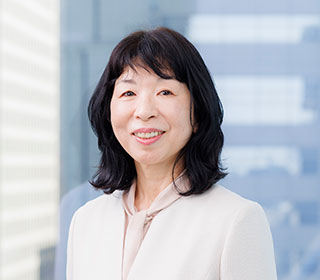
Diversity and Inclusion Department General Manager
We believe that incorporating diverse perspectives into our management and services is essential to meet diversifying Customer needs and to continue to grow.
Japan Post Bank established the Diversity and Inclusion Department in 2016 to promote DE&I initiatives.
Among these efforts, the activation of the Diversity Committee, whose members have a wide range of experience, and the enhancement of one-on-one communication have led to the creation of a system that makes the most of the individuality of every employee.
In addition, to further promote understanding of DE&I, we are increasing opportunities for management to think about and share their own ideas on DE&I promotion by holding dialogues between management and outside experts, and by sending messages from management at company-wide events with the theme of well-being.
Furthermore, we have introduced a healthcare service for employees and are creating an environment in which each employee can autonomously learn about diversity and well-being and obtain necessary information.
Related Information
Japan Post Bank DE&I Dialogue with Ms. Sputniko! and Executive Members
Diversity Committee (promotion framework)
We have formed a Diversity Committee of volunteers from employees nationwide to plan and implement initiatives tailored to organizational issues.
Depending on the specific challenges faced by each organization, such as communication or balancing work with childcare and nursing care, the committee organizes seminars, study sessions, and workshops. By sharing the details of these activities with one another, members continuously refine and improve their efforts.
At the company-wide event, "Japan Post Bank DE&I Forum," approximately 700 employees participated both in-person and online. During the forum, Ms. Yuka Shimada and our President & CEO exchanged views on well-being. Moving forward, we will continue to work together with Diversity Committee members nationwide to further advance DE&I initiatives.
Related Information
Japan Post Bank DE&I Forum Talk Event with Ms. Yuka Shimada and President Kasama
Japan Post Bank DE&I Forum 2025
Diversity Enhancement Month
To further deepen each employee's understanding of diversity, we have established the Diversity Enhancement Month, in which all employees are aware of diversity.
In FY2025, a diversity-related in-workplace study meeting was held for all employees, and a seminar was held for managers.
Diversity Promotion Training
Various training programs are held to promote the understanding and promotion of diversity.
In FY2024, we organized seminars, workshops, and workplace study sessions on a wide range of topics, including well-being, balancing work with childcare and nursing care, and LGBTQ+ issues. We also expanded opportunities to consider diversity by making seminars hosted by the Diversity Committee available for viewing nationwide.
In FY2025, we will hold a workshop for headquarter general managers led by Ms. Masako Ikehara, as well as training sessions for headquarter managers conducted by Ms. Sachiko Habu. Additionally, we will further encourage the use of healthcare services introduced in FY2023, such as support for women’s health, to create an environment where each employee can autonomously learn about diversity and well-being and access the information they need.
We will continue our efforts to expand the circle of employees who understand and promote diversity.

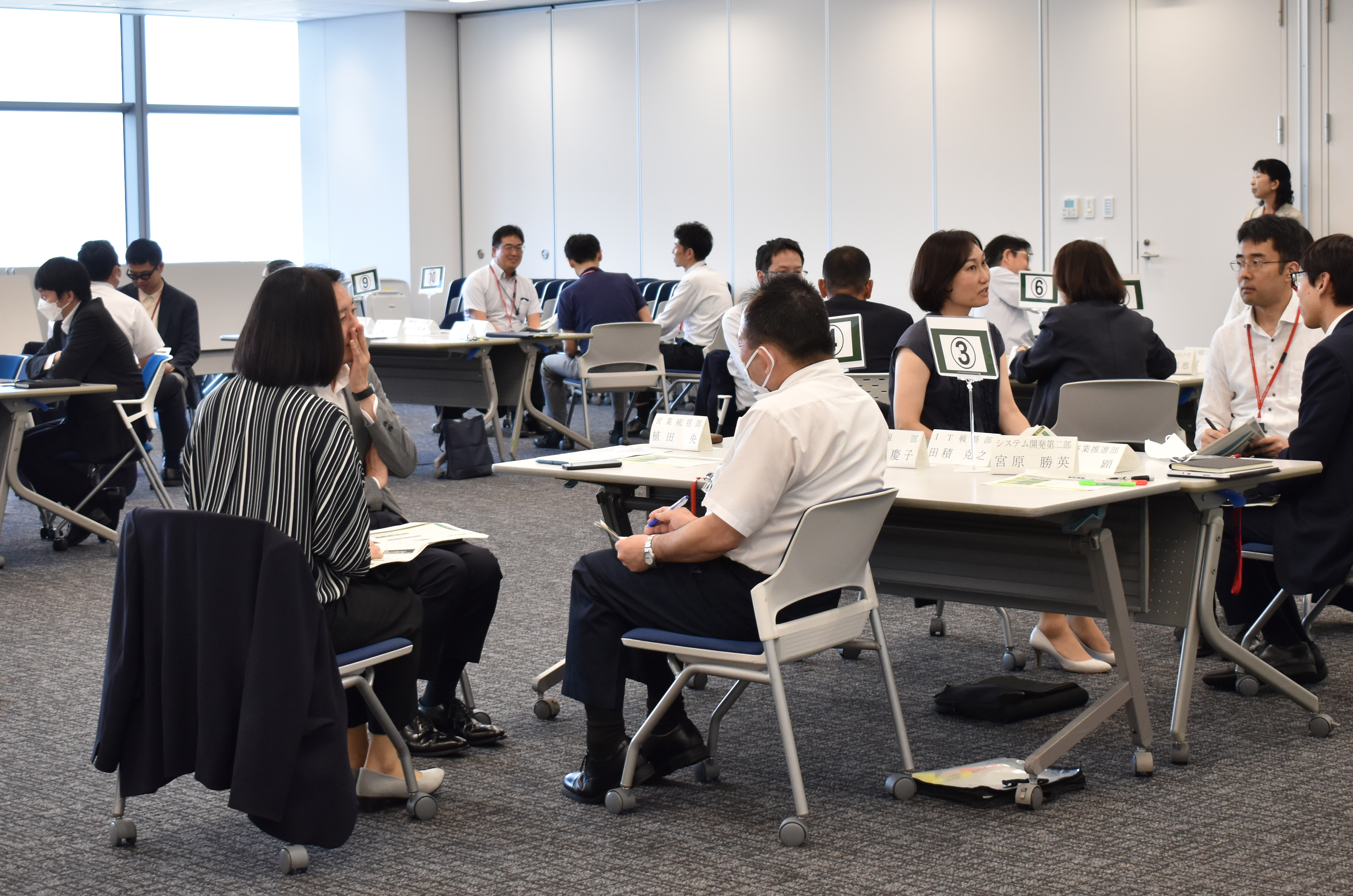
Promotion of Women’s Participation and Advancement in the Workplace
In order to provide services from the viewpoint of consumers, the active participation of female employees, who account for more than 40%, is considered essential in aiming to be "the most accessible and trustworthy bank."
For this reason, we have set the goals of achieving a 20% ratio of female managers for the entire company in April 2026 and a 30% ratio of female managers for the head office in April 2031 as KPI for promoting women's careers. We are advancing initiatives focused on ① reforming awareness within the company, ② cultivating female leaders, and ③ supporting the success of employees and improving the environment.
Specifically, we have been working to address issues such as the lack of role models by conducting career dialogues, "Diagonal 1on1," between female managers and female employees across different organizations, and by holding roundtable discussions with various executives and employees, including female outside directors.
Through these efforts, the ratio of female managers was 19.8% as of April 2025.
Women's Leaders Network
In February 2024, we launched the Women's Leaders Network, comprising female executives and department heads at our headquarters, to further promote women's active participation. Within this network, we hold monthly discussions on the challenges hindering the promotion of women's active participation and the measures to address these challenges. The network members, the Diversity Promotion Department, and related organizations collaborate to develop initiatives that contribute to the development of the next generation of female leaders.
In the fiscal year 2024, we held roundtable discussions aimed at identifying the issues that female managers face on a daily basis, and conducted career sessions for female executives to support career development by expanding the recognition of diverse role models.
Additionally, in November 2024, to further the development of network members, we held a roundtable discussion between network members and female outside directors. During this discussion, there was an active exchange of opinions on initiatives to promote women's active participation and ideas for becoming a platinum company, based on the careers and experiences of the outside directors.
Participants expressed that they were able to reaffirm what is necessary to become a platinum company where employees find it easy to work and feel a sense of purpose. They recognized the importance of engaging employees to reform organizational culture and develop human resources, while being mindful of what "only Japan Post Bank can do."
In FY2025, , the number of network members has increased, and members are now divided into three groups—"Leader and Supervisor Support," "Support for Female Employees," and "Life and Career Support"—to facilitate deeper discussions.
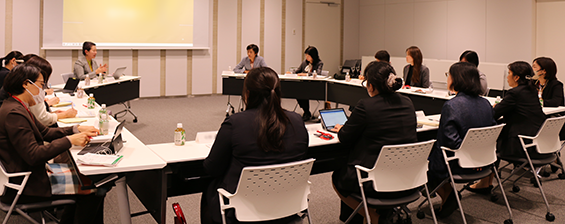
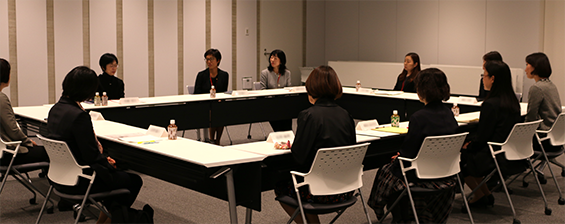

(ratio of male and female employees by position among full-time and re-employed employees)

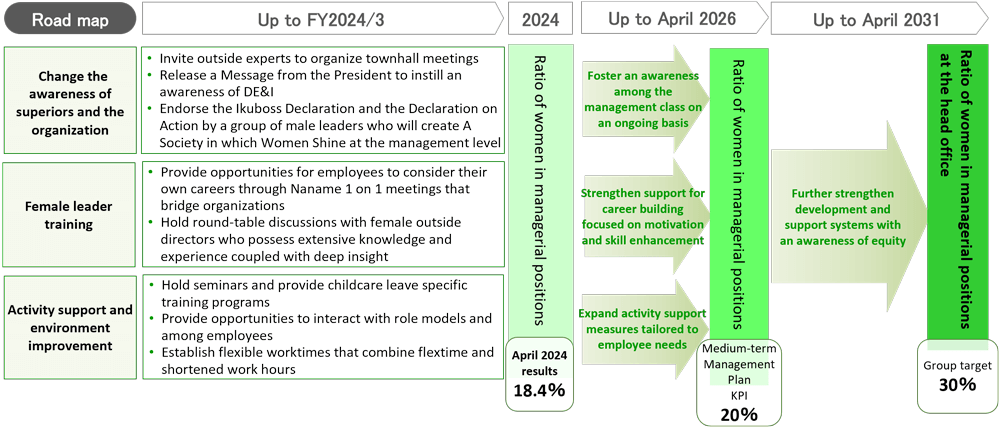
Related Information
ESG Data - Society: "Number and percentage of women in managerial positions"

Kunie Hamaguchi
Head, Call Center Department, Customer Satisfaction Department
In FY2024, while engaging in call center operations and other duties, I participated in roundtables for female managers and in "Diagonal 1on1" a dialogue policy with female general managers of other divisions. In dialogue with knowledgeable female leaders, I realized that valuing communication and increasing connections with others would lead to the realization of an ideal state. While valuing my daily work, I realized that stepping out and taking on challenges could lead to opportunities for growth.
This year, after assuming the position as head of the Call Center Department, I want to support employees in discovering what they themselves want to achieve and what they can contribute to those around them, so that every one of them can work with vigor and enthusiasm.
Participation in the "Male Leaders Coalition for Empowerment of Women"
Takayuki Kasama, President and Representative Executive Officer of the Bank, participates in the Men's Leaders Meeting to Accelerate the Active Participation of Brilliant Women (Secretariat: Cabinet Office).
We will accelerate our efforts for gender equality and women's empowerment while deepening our network of male leaders in various industries throughout the country.
*
The Men's Leaders Meeting to Accelerate the Active Participation of Brilliant Women is a group of corporate managers, etc. to accelerate initiatives by companies, etc. by promoting initiatives in accordance with the Declaration of Conduct to promote gender equality and the active participation of women, as well as by building networking among participants and sharing initiatives and issues.
Participants contribute to fostering social momentum for gender equality and women's empowerment by proactively disseminating their ideas and efforts both inside and outside the company.
Currently, about 320 people, including corporate managers, governors, and municipal heads, are participating.
For details, please refer to the following link.
Male Leaders Coalition for Empowerment of Women
Commitment from the top of the organization (Japanese version only)
Internal Communities
We have established internal communities where employees with shared interests or concerns can communicate, exchange opinions, and share information. These communities are designed to facilitate interaction among employees and foster a supportive environment within the company.
Career Jam:
Let’s Have a Session!

Career
Papa & Mama Peer Support Group

Balancing Childcare and Work
Let’s Think Together! Business Carers

Balancing Nursing Care and Work
Ally Club!

LGBTQ+
Health Plaza

Health
Can-You Association of Illness Peer Support Group
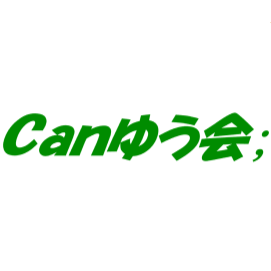
Balancing Illness and Work
Participation of Diverse human resources
Japan Post Bank actively recruits and hires talent from various backgrounds to continuously respond to the needs of its diverse customer base and society in general.
Related Information
ESG Data - Society: "Employees with Disabilities"
Activities of people with disabilities
Japan Post Bank actively employ those with disabilities, and employees with disabilities participate in organizations around Japan.
In order to expand the opportunities for employees with disabilities to continue working for a long time with a sense of security and to work continuously in accordance with each employee's situation, we actively provide support for the improvement of the work environment, etc.

Opening of Aichi Komaki Farm
Aichi Komaki Farm was opened to create employment opportunities for people with disabilities and raise awareness of normalization within the company.
Six staff members with disabilities and two heads of the farm cultivate a variety of vegetables. Since FY2024, we have been conducting normalization training for new employees in some areas.
By deepening exchanges while learning about agricultural work from staff with disabilities, we are raising awareness and contributing to the promotion of normalization within the company.

Japan Post Bank ARIGATO Center
In 2010, JAPAN POST BANK established and began operating the JAPAN POST BANK ARIGATO Center for the purpose of providing people with disabilities who desire to work opportunities for new and continued employment so that they can live independent lives.
Employees at the Center handle everything from bagging to shipping the candies handed out to customers at branches.
Moreover, we help employees with disabilities gain a higher level of motivation to work and remain in their positions by conveying our appreciation through letters.
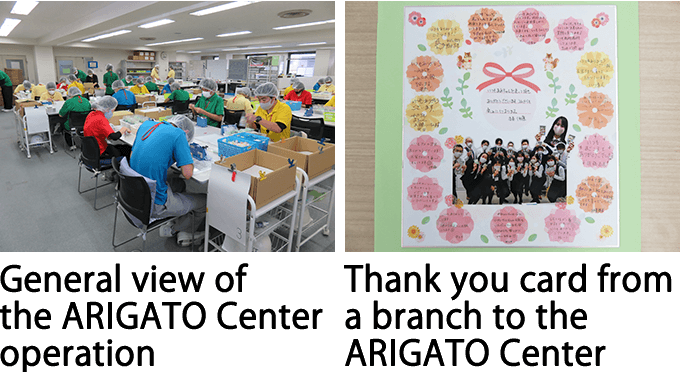
Massage room
Since FY2017/3, some employees with visual impairments have been participating as in-house physiotherapists (Health Keepers) at several Operation Support Centers and head office.
By having them work as in-house physiotherapists, we are integrating the employment of people with disabilities with welfare and health management.

Employment assistance for people with disabilities
Through a tie-up with special needs schools and schools for the visually impaired, we host trainees as an occupational experience so that people with disabilities can find work where they can fully utilize their skills.
Challenged Teams at Headquarters
In the Diversity Promotion Department at the Head Office, people with disabilities are engaged in all sorts of cutting-out work within the Head Office, focusing on postal services and business card preparation, making use of their PC skills and other skills.

Growing together with the company
Since joining the company in FY2012/3, I've been involved in a variety of job duties at the headquarters Human Resources Department, including employment of people with disabilities, internal control, and labor relations. Today, I'm mainly working in payroll.
I decided to join the company because I wanted to see for myself how Japan Post Bank, with its nationwide network as well as close relationships with people from all walks of life, has changed since privatization. The deciding factor became my conviction that someone with a hearing impairment such as myself can grow together with the company based on my dealings with the hiring manager of the Human Resources Department at the time.
Able to balance work and childcare thanks to our extensive programs.
I returned from childcare leave in April 2020. Prior to taking leave, I read the handouts from the seminar for new mothers/fathers and the Work-life Balance Guidebook. During leave, I took seminars on scheduling post return and which provided a trial experience with finding the right daycare in an effort to alleviate my concerns.
Currently, I'm taking partial childcare leave. This leave, which can be taken until my child becomes a third grader, can be taken in hourly increments up to two hours a day depending on how busy I am at work. Also, I also use paid leave set aside for caring for my child in case of a sudden fever or illness. I look forward to continuing my career while taking advantage of these leave programs depending on the situation.
Hoping to support others someday
I returned to work during the state of emergency issued as a result of the COVID-19 pandemic. Initially, there was a shortage of telework terminals, but my coworkers made it possible so I could work from home first. They also adjusted my workload, which made the transition back to work easy, which offset my concerns during leave about balancing work and childcare after returning to work.
However, with mask wearing the norm, I've lost my bearings somewhat at work and in my everyday life because it is harder to understand what people are saying when I cannot read their lips under their mask. During meetings with multiple people, I don't even know who is talking, so I need to rely on the written summary. When I'm having difficulty, coworkers will remove their mask naturally and talk in a way where I can easily read their lips or they write down what they want to say. This has really helped. I feel like the culmination of these small acts of consideration have resulted in a really comfortable workplace, good human relationships and as an extension strong teamwork.
I am the one receiving support at the moment, but in the future I hope to be the one providing this support. At the same time, I hope to acquire new certifications and take continuing education courses for my AFP certification that I obtained this year. I plan to take some time out from childcare to do this.
- *:
- Job titles are at the time of interview
Employing senior human resources
At Japan Post Bank, approximately half of our employees are aged 50 and over. We believe that the active participation of senior employee is essential for the Bank's sustainable development.
To support this, we conduct career design training for pre-senior employees aged 55 to 59, providing them with an opportunity to reflect on their careers and understand the roles expected of them after the age of 60.
As part of our efforts to promote the active engagement of motivated and skilled senior employees, we identify suitable positions and responsibilities that allow them to leverage their knowledge and experience, and assign roles based on individual skill sets.
For example, senior employees are actively involved in supporting newly appointed managers and providing consultation and assistance to employees regarding work-related concerns. Currently, 32 senior staff members serve in support roles across the organization.
Furthermore, starting in fiscal year 2025, we have appointed eight Career Advisors to enhance career consultation services and support employees in achieving career autonomy.
In March 2025, we held a joint group “Life Planning Seminar” in the Okinawa region, targeting senior and mid-senior employees. The seminar covered topics such as the roles expected of senior employees and support for reemployment after retirement. Participants shared feedback such as, "It made me realize the importance of life planning."
Looking ahead, we will continue to strengthen career development support and expand opportunities for senior employees through initiatives such as the introduction of Self Career Dock and the enhancement of reskilling environments.

Promoting an understanding of LGBTQ+
In order to create workplace environments in which all employees can thrive with peace of mind, Japan Post Bank, distributes the Ally sticker*1 as a symbol of understanding and support for the LGBTQ+ community, and sponsors Tokyo Pride*2.
At the same time, we have set up a Diversity Enhancement Month and hold in-workplace study meeting. And we share and evaluate the status of initiatives with Group companies and labor unions.
In addition, the Group jointly and the Committee independently hold online seminars featuring LGBTQ+ individuals and other parties,and the content of these seminars is shared by members throughout the country.
Moreover, the Bank now includes same sex partners in our definition of spouse for our various systems. This allows all employees to take advantage of marriage leave, bereavement leave, dependent allowances, and company family housing, for example.
These efforts have resulted in work with Pride *3 being the highest-rated Gold for the eighth consecutive years since 2018 in PRIDE Index for evaluating corporate and other initiatives related to LGBTQ+ and other issues.
- *1:
- People who offer support and understanding for LGBTQ+ people.
- *2:
- An event held by the NPO Tokyo Rainbow Parade. The parade is held with the aim of creating a society where all people can be themselves and live positively with pride, regardless of sexual orientation or gender identity.
- *3:
- The goal of work with Pride is to provide information on creating workplaces in which LGBTQ+ persons in Japanese companies can be themselves. The organization offers opportunities for companies to work actively on LGBTQ+ issues.


Recruitment throughout Japan and in each area
Japan Post Bank conducts recruitment for major career track positions throughout Japan and area-specific key positions in each area.
Related Information
ESG Data - Society (Status of Recruitment)
Work-life Balance Support System
Japan Post Bank has put in place a support system that exceeds that which is required by laws and regulations, in order to allow employees to continue to work, rather than leave the company, in times when they cannot attend the workplace for reasons such as pregnancy, childbirth, raising children, caring for family members, or undergoing medical treatment.
In addition, the Bank is supporting employees to achieve a more independent and autonomous work-life balance through combining measures such as raising awareness through various internal seminars and e-learning courses about work-life balance and expanding the adoption of telework.
Fostering of Ikubosses
Believing the presence of Ikubosses* to be essential to achieving workplaces where each and every employee can work comfortably and enjoy their experiences, we are working to foster Yucho Ikubosses based on the four conditions of Yucho Ikuboss.
In FY2017, the heads of each organization at JAPAN POST BANK, including the President and Representative Executive Officer, made the Yucho Ikuboss Declaration. Since FY2018, we have expanded the scope of Ikuboss to all managerial positions and worked to foster Yucho Ikuboss through the Yucho Ikuboss Declaration, diversity (Ikuboss) training, and Yucho Ikuboss Certification.
*:
An Ikuboss (or "New-era" Boss) is a manager/an executive who (a) considers his/her staff's work-life balance and supports their career, (b) achieves his/her organization's business targets, and (c) enjoys his/her own life outside of work.
| The Four Yucho Ikuboss Principles |
|---|
|
| Yucho Ikuboss Declaration |
|---|
 Takayuki Kasama |
Management Training Program (Japanese version only)
Balance Support System
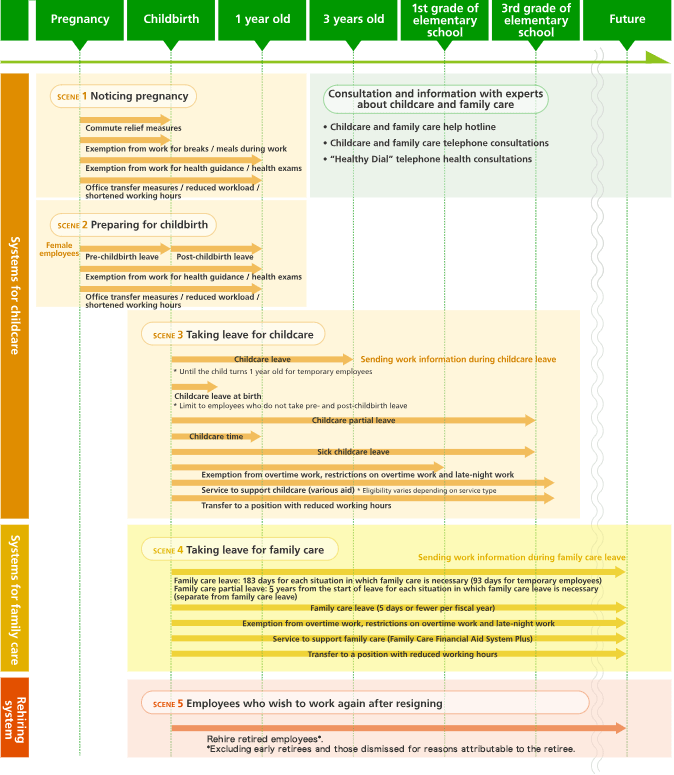
| Measures | Age of child | Paid | Contents | |||||
|---|---|---|---|---|---|---|---|---|
| 1 year old |
3 years old |
Entrance into elementary school |
3rd grade of elementary school |
6th grade of elementary school |
||||
| 3 days paid childcare leave | Yes | The first three days of childcare leave will be paid until the day following the date on which eight weeks have elapsed from the date of the child's birth (or expected date of delivery). | ||||||
| Childcare leave at birth (employees who do not take childcare leave after birth) |
(Legal)
(Japan Post Bank)
|
No | Employees who have not taken maternity leave before or after childbirth may take childbirth leave for up to four weeks (28 days) within eight weeks from the date on which the child is born or the expected date of childbirth, whichever comes later. | |||||
| Childcare leave | No | Employees raising children under the age of three may take childcare leave until the child reaches the age of three. The term of employment shall be up to one year of age, provided that the term of employment shall be up to one year and two months of age if both parents meet the requirements such as childcare leave, and up to two years of age if they are unable to admit to a nursery center, etc. |
||||||
| Childcare partial leave |
|
No | Employees raising a child under the age of nine in the fiscal year concerned may take partial childcare leave for up to two hours a day until March 31 in the fiscal year when the child reaches the age of nine years (12 years in the case of a child with a disability or chronic illness). In some organizations, this system can be used in combination with the flextime system. |
|||||
| Childcare period | Yes | Employees can take childcare leave twice a day for up to 45 minutes each until their child reaches the age of one year to take care of a nursing home or a daycare center. | ||||||
| Sick-child care leave | Yes | Employees raising a child before the end of the third grade of elementary school may take leave to care for a child injured or ill for up to five days (10 days if there are two or more children) per year. | ||||||
| Exemption from overtime, etc. | ― | Employees raising a child who has not yet entered elementary school may apply for exemption from overtime work or work on weekly holidays in order to raise a child. | ||||||
| Overtime and night-work exemption | ― | Employees raising children who have not yet entered elementary school may apply for restrictions on overtime work (up to 24 hours per month and up to 150 hours per year) and late-night work (restrictions) to raise children. | ||||||
| Transfer to a position with reduced working hours | ― | Those who are recognized by the company as having special circumstances such as childcare may wish to convert to 8 hours/day, 10 days/4 weeks (shorter working hours I type) or 4 hours/day, 20 days/4 weeks (shorter working hours II type). | ||||||
| Rehire for resigned employees | ― | A system is in place under which a permanent employee who retires for childcare or other reasons is re-employed as a permanent employee after the need for childcare has been resolved. | ||||||
| Measures | Period | Paid | Contents | ||||||
|---|---|---|---|---|---|---|---|---|---|
| 5 days |
93 days |
183 days |
1 year | 3years | 5years | ||||
| Family care leave |
|
(Legal) (Japan Post Bank) | No | Employees taking care of a Person Requiring Long-Term Care may take a total of 183 days for each Person Requiring Long-Term Care until the Condition of Need for Long-Term Care is terminated.Employees deemed to be subject to special circumstances may take leave within one year from the start date of leave. (A total of 93 days are employed by the Term Employee.) |
|||||
| Family care partial leave | No | Employees who take care of a person requiring long-term care can take part-time leave within five years from the start of use within four consecutive hours from the start time or four consecutive hours from the end time. | |||||||
| Family care break | No | Employees who take care of a person requiring nursing care may take leave to care for a person requiring nursing care or take other necessary care of a person requiring nursing care for up to five days per year (10 days if there are two or more persons requiring nursing care). | |||||||
| Exemption from overtime, etc. |
No time limit
No time limit
|
― | An employee who is taking care of a person requiring nursing care may apply for exemption from working overtime or on weekly holidays. | ||||||
| Overtime and night-work exemption |
No time limit
No time limit
|
― | An employee who is taking care of a person requiring long-term care may request restrictions on overtime work (up to 24 hours per month and up to 150 hours per year) and late-night work (not engaging in late-night work). | ||||||
| Transfer to a position with reduced working hours | ― | Persons acknowledging that there are circumstances such as nursing care may wish to switch over to 10 days a day 8 hours/4 weeks (Short-Working I-type) or 20 days a day 4 hours/4 weeks (Short-Working II type). | |||||||
| Rehire for resigned employees | ― | There is a system in which full-time employees who retired for reasons such as nursing care are re-recruited as full-time employees once the need for nursing care has been eliminated. | |||||||
- *:
- The above chart applies to employees who work eight hours per day.
- *:
- Japan Post Bank allows employees to take childcare leave regardless of gender, and benefits are provided during the leave. Funding for benefits includes employment insurance premiums paid by companies.
Producing Handbooks
To help employees use the different systems with peace of mind, we have produced and distributed among them various manuals such as a support guide for balancing work and childcare and a work-life balance support handbook for managers, which outline the points that superiors should know and attend to in the period from when a female employee applies for maternity leave until the day she returns to work. Other manuals include a work-life balance handbook that explains the different support systems for childcare and family care, as well as a family care support book that covers the process that occurs when an employee has to provide care and the ways a manager can respond to the issue.
Childcare and Family Care Support System
We provide aid for various childcare-related measures, including aid for using babysitters, aid for using monthly childcare, and aid for using childcare for sick or convalescent children, as well as subsidies for family care to employees who are engaged in family care.
Set up Mommy Room
In March 2024, we opened a milking facility, the Mommy Room,at the Otemachi Head Office so that women who have given birth can return to work when they want.
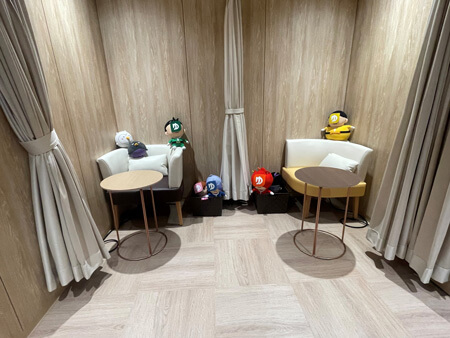
Establishing day care centers at offices
As a means of supporting a balance between childcare and work, in April 2019 we opened the Yutemachi Day Care Center, a workplace day care center at JAPAN POST GROUP’s headquarters building in Otemachi.
Leave of absence for accompanying spouse
In order to provide long-term support for employees' working styles in response to various life events, it is possible for employees to take a leave of absence within three years in order for them to live with their spouses when their spouses live in distant areas due to work or other circumstances.
Holding of All Types of Training Programs/Seminars
We hold a variety of work-life balance-related seminars, such as for employees who are expecting a baby, employees returning to work after childcare leave, and seminars on balancing work and caregiving. In addition to providing support for employees to balance their childcare or caregiving obligations with work, we conduct online seminars to help staff who are on leave return to work without stress or anxiety.
We also raise awareness by holding lectures on work-life balance in our internal training programs.
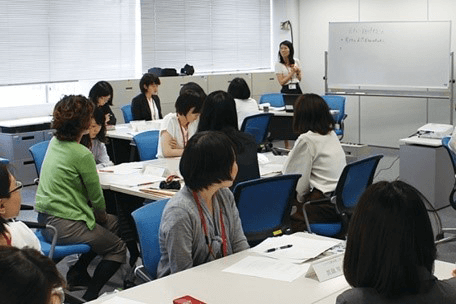
Childcare Leave for Male Employees
JAPAN POST BANK supports the "Declaration of Full Childcare Leave for Male Employees" by WORK LIFE BALANCE Co., Ltd.
At Japan Post Bank, we believe that it is important to create an environment in which each and every employee can be highly motivated as a "Team Yucho" and maximize their capabilities. We therefore promote diversity management as one of the important management issues.
In recent years, with the increase in dual-income households, it has become common for childcare and household chores to be shared by both spouses. Acknowledging these societal shifts, our bank is dedicated to creating an environment where employees can confidently take childcare leave without it negatively impacting their careers. Furthermore, we are implementing various initiatives to actively encourage male employees to participate in household duties and childcare.
With regard to the Bank's childcare leave system, the length of time taken exceeds the legal requirement (up to three years of childcare leave and up to nine years of childcare parental leave). To enable men to actively participate in housework and childcare, a portion of the childcare leave has been made paid since October 2018. In addition, the Company has mandated that department heads encourage and confirm employees' intent to take childcare leave of four weeks or more. Furthermore, in order to create a workplace environment that makes it easier to use the system, we distribute support handbooks for male employees and managerial employees and conduct e-learning, etc.
As a result of these initiatives, the acquisition rate of childcare leave for male employees lasting four weeks or longer, and the average number of days taken, have significantly increased from 30.1% and 31.1 days in fiscal year 2020 to 78.8% and 82.8 days in fiscal year 2024.
Moving forward, we will continue to respect the diverse lifestyles of each employee, promote flexible and healthy working styles, and strive to create an environment where all employees can actively participate in childcare.
Declaration of Full Childcare Leave for Male Employees (Japanese version only)
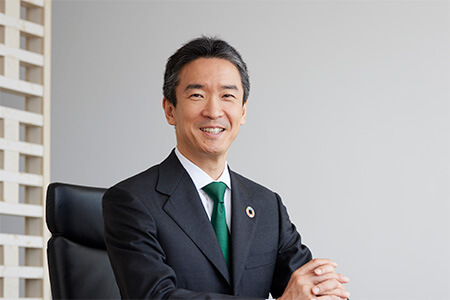

Takayuki Kasama
For the fiscal year ended March 31.
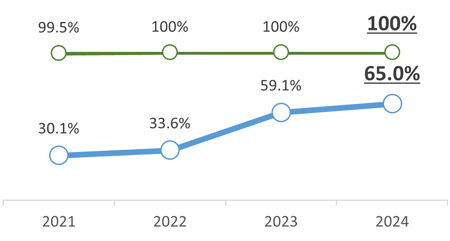
-

Ratio of employees taking childcare leave (regardless of gender)
-

Ratio of men taking childcare leave for at least four weeks
Measures to promote the use of childcare leave
From the perspective of supporting both men and women in balancing work and home life, we actively promote the use of childcare leave so that any employee who wishes to do so can participate in housework and childcare. Specifically, we are creating a culture in which taking childcare leave is a matter of course by making some childcare leave paid and introducing stories of employees' experiences in the company newsletter. In addition, a lump-sum payment system to support childcare leave will be newly established in October 2025, and the entire working environment is being improved to provide follow-up support. Since FY2021, the rate of male employees taking childcare leave has been maintained at 100%, and the rate of male childcare leave rate taking four or more weeks of leave was 78.8% (average number of days taken: 83) in FY2024. In recognition of these efforts, we have been certified as a Platinum Kurumin company.
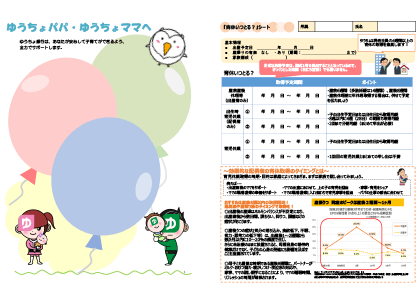

Creating an Environment for Voluntary Learning During Childcare Leave
We have established an e-learning program that can be accessed from home. This program features information useful for childbirth, childcare, and nursing care, as well as content that can be used for work and management after returning to the workplace, as well as training content for each rank, including a training program that specializes in childcare leave for acquiring the ability to overcome the balance between work and family. The content is used to promote understanding and raise awareness.
In FY2024, we introduced an information linkage system at our head office that enables employees to exchange information with each other during childbirth leave and childcare leave, as well as to make various announcements from the Human Resources Department.

